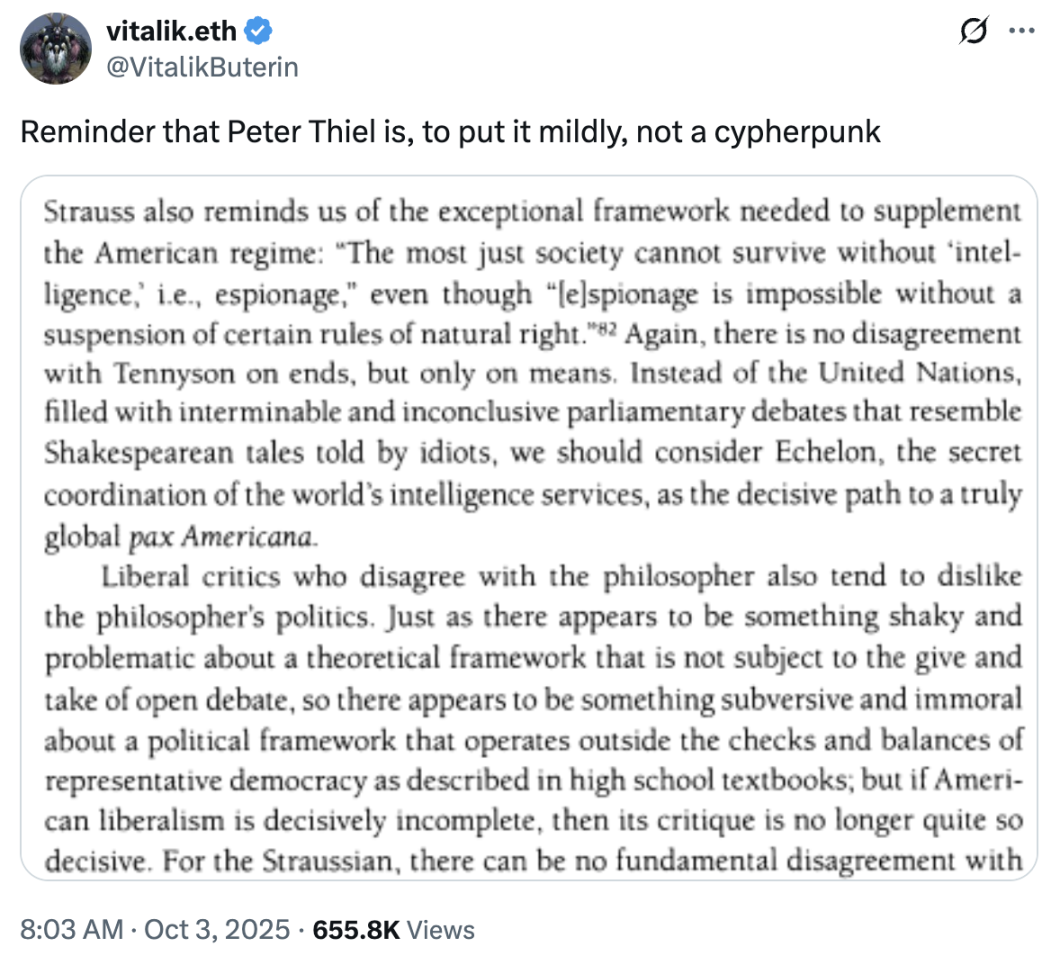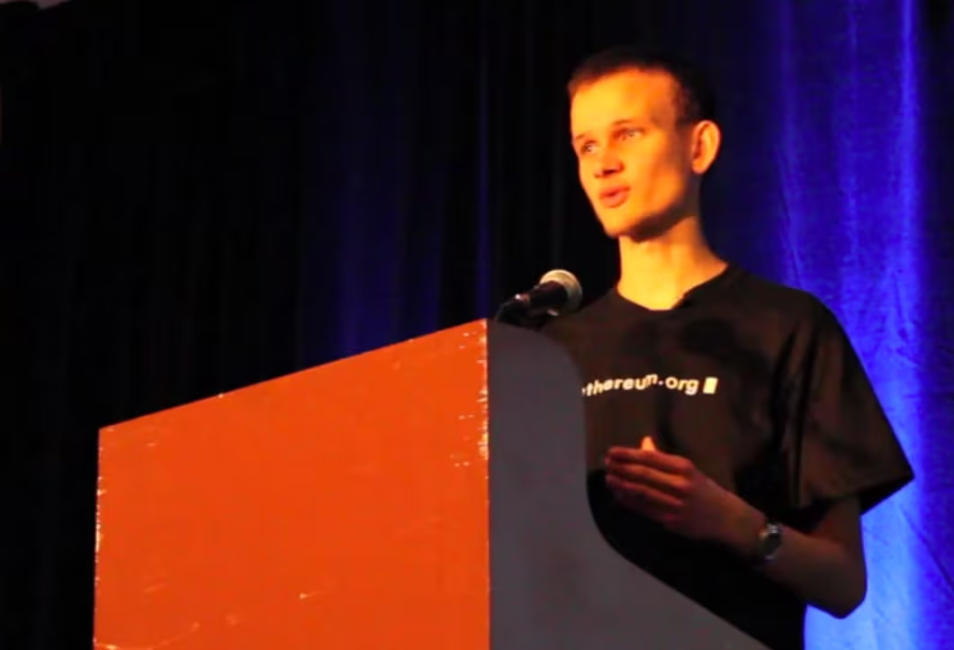Vitalik publicly questioned Peter Thiel's "non-cyberpunk" stance, which is a factional struggle in technological thought.
By Eric, Foresight News
Yesterday morning Beijing time, Ethereum co-founder Vitalik Buterin posted a screenshot of an article written by Peter Thiel in 2009 on X, with the caption: "Reminder that Peter Thiel is, to put it mildly, not a cypherpunk."

If Vitalik's concerns two months ago about the risks of over-leverage in Ethereum DATs were merely a "friendly reminder," then this time, his direct criticism of Peter Thiel, a backer of BitMine and ETHZilla, two publicly traded Ethereum DATs, can be seen as a "direct challenge." However, this challenge doesn't appear to be solely directed at DAT companies. Vitalik's real concerns may be related to Peter Thiel's extreme political views, which are precisely the opposite of the cypherpunk ideologies that uphold decentralization.
Peter Thiel: I no longer believe freedom and democracy are compatible
Last October, Polymarket refuted the New York Times' report that it had political leanings. In its response, it stated that although Peter Thiel is the founder of Founders Fund, an investor in Polymarket, his political leanings will not affect the operation of the platform.
Peter Thiel’s extreme political leanings are no longer news, but this seems to be the first time it has been widely discussed in the Web3 world.
The screenshot Vitalik posted is from Peter Thiel’s 2009 article “The Education of a Libertarian”. In the article, Peter Thiel expressed his extreme disappointment with politics and believed that liberals at the time should find a way out of all forms of politics. He said, “Since there is no longer any truly free place in our world, I suspect that the way to escape must involve some new and hitherto untried method, leading us to some unknown country; for this reason, I am committed to studying new technologies that may create new spaces for freedom.”
The new technologies mentioned by Peter Thiel include three possible areas: cyberspace, space and oceans.
This article was published shortly after Bitcoin's launch, against the backdrop of a global financial crisis unleashed by Wall Street's greed. Peter Thiel advocates for using technology to bypass politics and create an absolute libertarian utopia. However, he rejects the "techno-utopianism" that assumes technology possesses its own power and will. Instead, he believes technology should confront politics, creating a new world free from political control.
In this description, it seems that Peter Thiel's propositions are similar to those of the early cypherpunks. They believe that technology can create a better world, and they also believe that the development of technology will one day break the constraints of politics and give birth to a truly free country.
Founders Fund, of which Peter Thiel serves as managing partner, has invested in a wide range of Web3 projects, including in recent years Polymarket, Avail, Igloo (the parent company of Pudgy Penguins), and Caldera, a Rollup-as-a-Service platform. While Peter Thiel shares the same belief in "technology changing the world" as crypto fundamentalists, his approach to achieving this goal has been quite different.
In "The Education of a Libertarian," Peter Thiel's disillusionment with democracy is actually a disappointment with egalitarianism. Since the expansion of universal suffrage (especially women's suffrage) and the expansion of the welfare state in the United States in the 20th century, "capitalist democracy" has become a self-contradictory fantasy. In his view, the egalitarian tendencies of the general electorate hinder a truly free market, and therefore liberals should "escape politics" rather than try to convince the majority of voters.
Peter Thiel and his followers, known for their superior understanding of technology and their foresight into future development, place greater trust in the "best minds"—technological and capital elites—to govern society, rather than relying on democratic procedures based on one person, one vote. Companies he has invested in, such as Palantir and Anduril, have undertaken numerous government surveillance and border enforcement projects, drawing criticism for "using algorithms and big data to replace democratic decision-making," essentially outsourcing public power to opaque private high-tech companies.
Frankfurt-born Peter Thiel's reading list includes works by Nazi jurist Carl Schmitt, civilizational decline theorist Oswald Spengler, and The Sovereign Individual. These ideologies share a disdain for universal suffrage, a reverence for power, and a belief in historical cycles and a "state of exception." Peter Thiel combines Schmitt's "friend-and-enemy" political perspective and Spengler's "good times-bad times" authoritarian fatalism with Silicon Valley's "technological acceleration" discourse, creating a hybrid ideology of "hyper-neoliberalism + anti-democracy" that scholars have called fascist inflection.
Renowned American journalist and historian Eoin Higgins, in his book "Owned: How Tech Billionaires on the Right Bought the Loudest Voice on the Left," published in February of this year, describes how tech leaders flocked to Trump after his 2016 election victory. On December 14, 2016, Thiel attended a Trump campaign meeting. The billionaire investor also brought along allies Elon Musk and Alex Karp, even though their respective companies, Tesla and Palantir, were not on the same level as companies like Google, Microsoft, and Apple at the time.
During Trump's second term, Peter Thiel was behind Vice President Vance and David Sacks, the White House director of cryptocurrency and artificial intelligence and the so-called "Crypto Czar." Elon Musk, his protégé brought to the White House during Trump's first term, has become another symbol of Silicon Valley elitism. The world's richest man, even considering the noise of rocket launches, has developed a near-insane hatred of the government, or more precisely, bureaucracy. This hatred has manifested in DOGE's frantic purge of certain government departments. Clearly, this extreme ideological confrontation has left Vitalik feeling a sense of unease.
Whose freedom is true freedom?
While both advocated for using technology to change the world, Peter Thiel chose to allow the elite to master technology and rule over the "mortals." Satoshi Nakamoto and Vitalik, on the other hand, were more committed to equal rights in technology, creating a stark ideological opposition. Vitalik's real concern was that a group of tech elites, armed with vast amounts of capital, would exploit their power and influence to transform Ethereum into a decentralized network controlled by extreme totalitarians. While Ethereum might still be the world's computer and handle the majority of transactions for stablecoins and tokenized RWAs, it would no longer be the Ethereum that cypherpunks envisioned.
Vitalik's direct motivation for developing Ethereum came from Blizzard nerfing his favorite World of Warcraft character. However, Vitalik isn't opposed to nerfs; he simply believes the decision should be made in a more democratic manner, and even if the final vote still results in a nerf, he's still okay with it. Peter Thiel, on the other hand, would arbitrarily choose not to nerf a character. This is perhaps the biggest difference between the two.
In the comments section of the tweet, Vitalik agreed with the view that "Ethereum needs to be like Bitcoin eventually, where development should stop/shut down at some point, or maintenance should be minimized." He supports gradual rigidification and a more cautious approach to major changes to the protocol after short-term expansion, streamlining of Ethereum, and clearing of technical debt.
This view actually corresponds to the "technological utopianism" mentioned by Peter Thiel. However, for Peter Thiel, who combines the denial of democracy, technological authoritarianism, and capital seizure of power, and goes beyond the boundaries of conventional conservatism or libertarianism, his view of freedom seems to be to restrict the freedom of the majority for the sake of absolute freedom for a few. This proposition with absolute "right" and "wrong" seems to bring "absolute political rule" to the other extreme of "absolute technological elite rule."

Interestingly, Vitalik received $100,000 in funding from Peter Thiel in 2014 to develop Ethereum. Eleven years later, while the then-innocent teenager has shed his crypto fundamentalism and become a leading figure in the decentralized world, Peter Thiel still clings to his extreme ideology, which I struggle to find the right words to describe.
In the next ten years, will Ethereum become a weapon of absolute freedom for a small number of people, or a tool of relative freedom for the majority?
You May Also Like

Luis Robert Jr. Fails To Reward White Sox For Their Patience

Blazpay ($BLAZ) vs Avalanche, Ethereum, Cardano, Moonbeam & Alephium
